Shot on iPhone 12 Pro Max by Kelsea Ballerini, for Rolling Stone Australia
Love, loss, life in isolation, and chasing the American dream
It’s the spring of 2015 and Morgan Evans is in a deep state of loneliness. He’d journeyed from the salty beaches of Newcastle in New South Wales to Nashville, Tennessee, the star-spangled Music City and acme for all country music songwriters. However, the rite of passage had left him feeling alone. At 30 years old, he felt like just a number. He was one of thousands of artists to make the move, following in the giant footsteps of country greats like Keith Urban, Dolly Parton, and Tim McGraw – but he barely had a foot in the door.
It would be another three years until Evans released his hit single “Kiss Somebody”, the song about a sure fix for his friend’s five-year hang up on an ex-girlfriend. The song, workshopped live at Nashville’s iconic Bluebird Café – and co-written with hit producer and longtime collaborator Chris DeStefano – reached Platinum certification in Australia and the top three on the US country chart; but Evans hadn’t even met DeStefano yet.
At this point, Evans was missing his band back home, made up of his school mates and his younger brother. His mum, a healthcare worker and his dad, a dental technician were from Armidale, the regional town in New South Wales dubbed Cathedral City. While both were supportive, the steel-city blue collar capital of Newcastle in the Eighties – where a career in music wasn’t considered a career at all – was eating away at his psyche. That and the fact he’d gone weeks with very few writing sessions filling his schedule interrupted his confidence.
“I don’t think I knew what anxiety or loneliness was until then,” he remembers, swivelling slightly in an office chair from home in Nashville.
“I never want to feel like I’m complaining, but just to be honest with you, moving to Nashville as a songwriter or a guitar player or a singer – or all of the above,” he trails off. “It was the hardest thing I’ve ever done and probably will ever do.
“It’s so lonely,” he continues. “There’s already thousands of people here that are better than you, at what you headed here to do. And they don’t need you, they don’t want you really.”
Love Music?
Get your daily dose of everything happening in Australian/New Zealand music and globally.
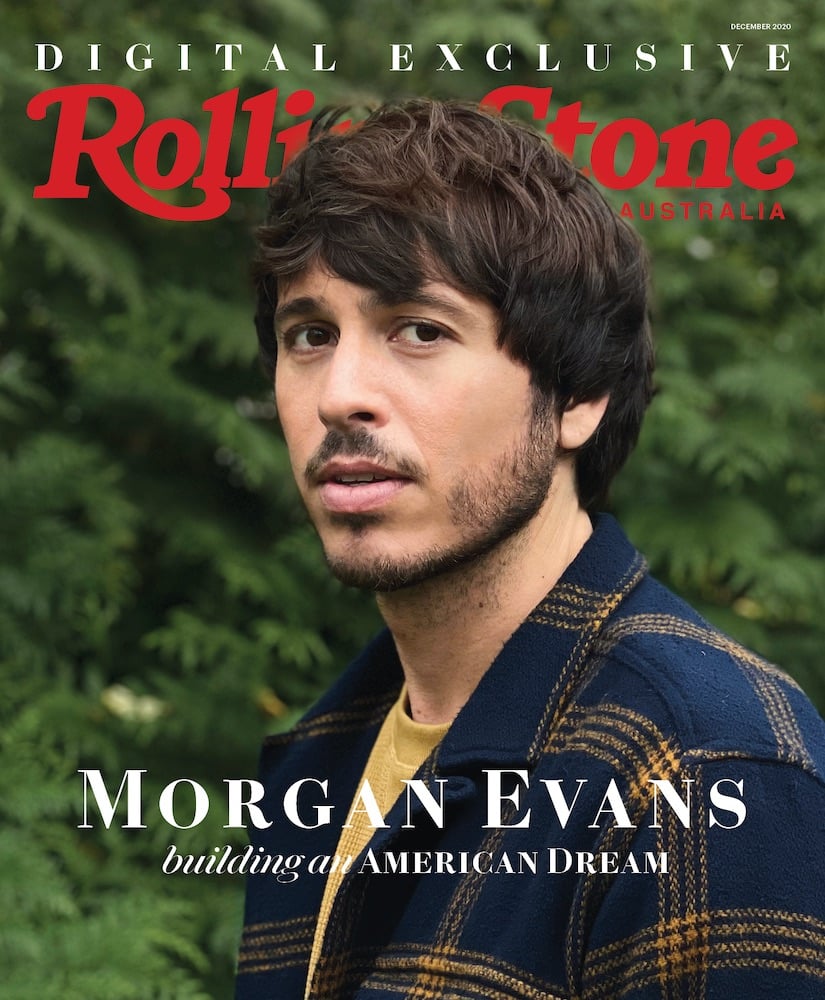
Morgan Evans photographed and directed by Kelsea Ballerini in Nashville, Tennessee, in November, 2020. Shot on iPhone 12 Pro Max. Styling by Josh Owen. Hair by himself, Morgan Evans. Jacket by Madewell. By Kelsea Ballerini for Rolling Stone Australia
A little over five years after the big move to the biggest music town in the world, Morgan Evans is sitting in what will be his new home studio in Nashville. The whole house is new to him actually. It’s a fast-tracked upgrade after almost a year in an apartment and staycation Airbnbs with his wife, multi-Platinum and award-winning artist Kelsea Ballerini. It’s getting dark outside and snowing as he chats to Rolling Stone over Zoom.
“When you get locked in for a few months you realise that maybe a little more space is better,” he jokes, taking a sip of tea from a mug. “We found out that we actually really like each other, which is fantastic.” He trails off again. “Some of our friends were not so lucky in that respect this year.”
It’s been a productive day at home for Evans. While his new country-spun cover of Mariah Carey’s “All I Want For Christmas” racked up millions of streams all over the world, Evans spent the morning swimming laps at his local YMCA public pool. He swims when he misses his beach-haloed hometown. He also played guitar after two months of nursing a cut finger, and organised some of the gear he uses when he does a loop show. “By the end of the tour that we did last year, my loop set up was the most ridiculous thing you’ve ever seen,” he offers that big, ingratiating smile. “It was like a box truck full of gear just to do a loop show.”
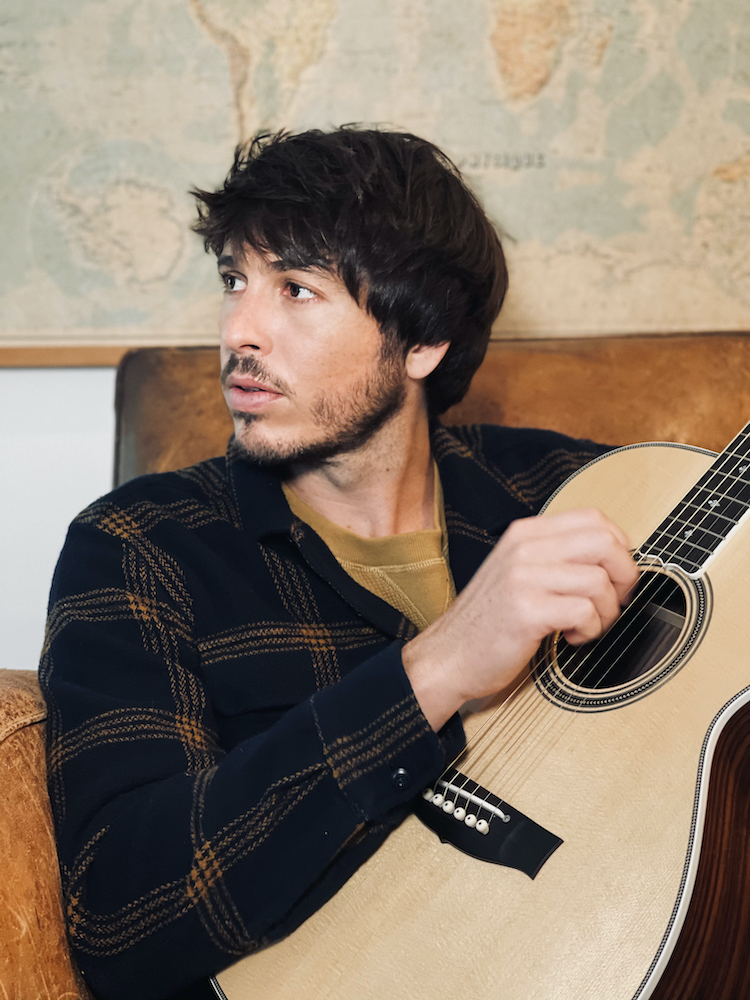
Morgan Evans at his home in Nashville. Shot on iPhone 12 Pro Max by Kelsea Ballerini for Rolling Stone Australia
By all indications, 2020 should have been one of Evans’ most successful years. At the beginning of the year he had completely transformed his live show from a one-man-band to a touring clan and if it weren’t for the invisible enemy currently defining this century, he would be on the road right now. It was supposed to start, he reveals, in March – “It feels like the greatest show that I never ever done.”
Evans has plenty of achievements to keep him content, however. Kelsea, his wife of three years, is downstairs with their dog Dibs (named after her 2015 hit song), he’s got two ARIA Country number one albums under his belt, a US Country Radio number one, a CMA Award, and he’s just landed his own radio show on Apple Music. He’s also survived almost a year without doing what he does best. In 2019, on his debut headline tour, he sold out shows in New York, Los Angeles, Chicago, London, and Australia and New Zealand.
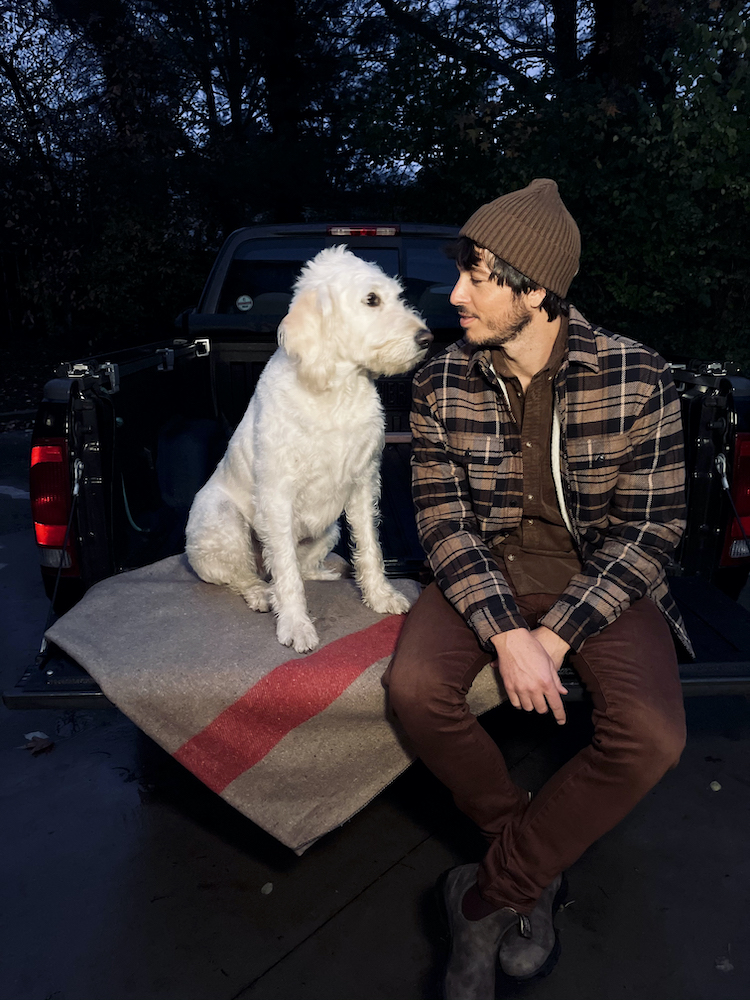
Morgan Evans with Dibs. Shot on iPhone 12 Pro Max by Kelsea Ballerini for Rolling Stone Australia
This year, Evans could have performed and sold out Hordern Pavilion-size shows if he wanted to. America’s social distancing regulations seem to be self-imposed amid the COVID-19 pandemic and differ from venue to venue. While some live venues are hosting thousands of sardine-packed fans, others have closed their doors indefinitely. For Morgan, he’s on a voluntary break from performing.
“I’ve chosen to not go and do shows during this time. I just feel like that’s the right thing to do. For me and for people who like my music.”
Morgan Evans doesn’t use terms like “my fans” or “fanbase” during our lengthy conversation. In fact, when he notes that he’d been back to Australia for work ten times in the two years before COVID hit, he uses air quotes when he says ‘work’. It’s as if he just can’t shake the fact that he turned music into a job, and the millions of fans who stream his music each month could have just hit the ‘play’ button on accident.
Evans is the type of guy who drops his jaw in disbelief when he sells out a show – like when he sold out two Enmore Theatres in Sydney in October 2019. He’s the type of guy who paints his own garage – like the one under the room he’s in now – and the guy who spends hours trying to help a bat who found itself lost in his bedroom one time. He’s also the guy who kept his old Ford F-150 truck because it carried him on a tour across the US in 2016.
“I call it my American Dream truck,” he smiles. “It’s definitely not a dream truck, but it was the start of my American Dream.”
Dolly Parton once said, “energy begets energy”. When Evans tells the story of his first ever trip to Nashville, you can’t help but believe it. In 2007 Morgan Evans won the now-inoperative Telstra Road to Tamworth competition, which saw him hop off a 21-hour journey to land on Music Row during the biggest music week of the year for the city, CMA Music Festival. Local agent Tony Conway just happened to catch him perform at a small showcase and called to ask him to perform at Nashville’s LP Field Stadium a few days later.
“[Tony] was like, ‘How would you feel about opening the show on Friday at the stadium?’ I was like, ‘I would feel pretty good about that. What do you want me to do?’.”
Evans had to purchase a clean shirt for his slot in support of none other than country heavyweights Miranda Lambert, Brad Paisley, and Big & Rich. He flew back to Sydney the next day, invigorated and in disbelief of the ‘fly by the seat of your pants’ opportunities that one city had to offer.
“I knew I had to be here, and I had to do this.”
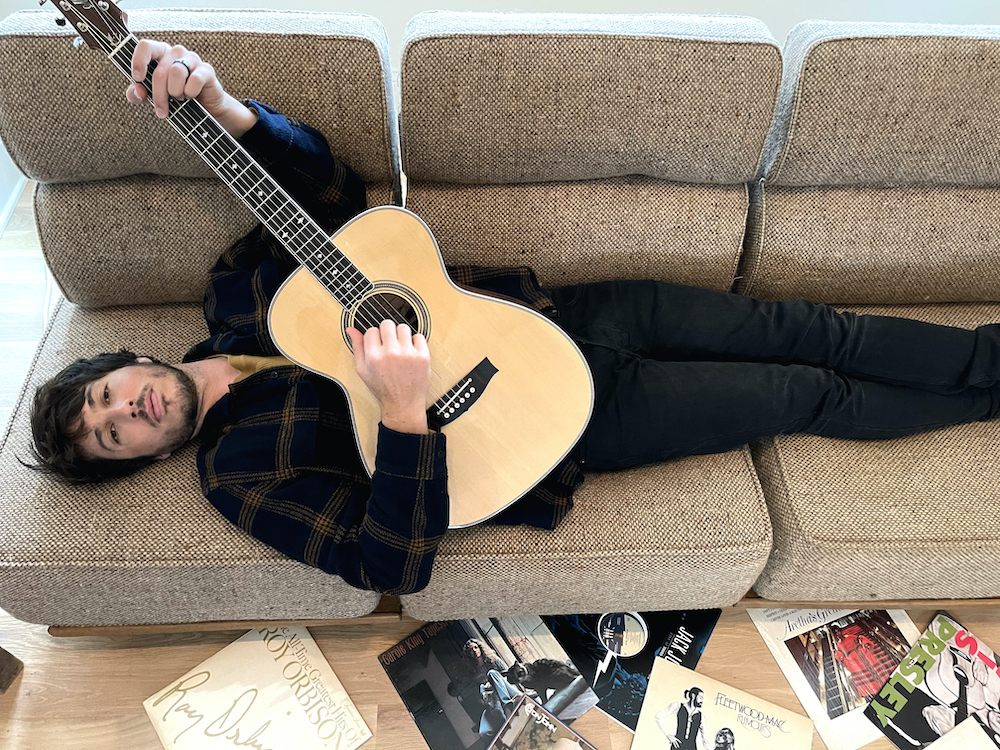
Morgan Evans in Nashville. Shot on iPhone 12 Pro Max by Kelsea Ballerini for Rolling Stone Australia
Morgan Evans is missing home more than usual right now. After a year of not seeing his family, the FaceTime calls and texts bring up familiar feelings of isolation. It’s any wonder; Evans’ childhood was sunkissed and blessed. He did Nippers as a kid (essentially surf lifesaving training for the under 14s) and started surfing at 13.
“I have very fond memories of being 14 or 15, getting the bus down to Blacksmiths Beach and surfing until you couldn’t move your arms anymore. And then eating a hot chip sandwich with the chicken salt and the BBQ sauce. You know, and the white bread.” He smiles to himself. “I was just thinking about that today.”
Evans was always a music-obsessed kid. At five, he played piano; at 11, he played baritone horn in the school band for two years. At 13, he switched to guitar and started Extortion, a band made up of his school mates and his 11-year-old brother. The band practised in the Warners Bay High music room at lunch and their offering was, eclectic, to say the least. Extortion’s first show was at local Newcastle pub SJ’s for a band competition.
“I remember, [my brother] just started screaming, as this 11-year-old. But it sounded like that terrifying, guttural… like, ‘I’m Corey from Slipknot’ or Max Cavalera from Sepultura. Just a roar,” Evans looks impressed, even 22 years later.
“But you know, the next song we played after that would be this surfer punk song. And then we would play a Keith Urban song,” he remembers. “It was like this weird combination of music which…,” he stops himself, smiling. “Maybe that’s why that band never really worked out.”
Evans did have a period where he put off pursuing his dream. He went to Newcastle University, started a law degree, and thought about getting what he was indoctrinated to call “a real job”.
“I did that for six months and then the head of the law department – I went and had a meeting with him – and he was like, ‘You want to play music don’t you?’ I said, ‘Yeah’. And he said, ‘You shouldn’t do this’.”
But small-town conditioning runs deep. Evans put his dreams on hold for another three years and completed a Bachelor of Communication degree. He played shows as much as he could, touring across Australia on the weekends; but during the week his time was filled with research and data analysis and media production principles. The passion for music never waned though, he even made a music TV show for one assignment, taking cues from Foxtel’s sadly demised Channel V and inviting a friend’s band to the uni’s studio. As life would have it, in 2014 Evans began a three-year stint as a music host on Foxtel’s Country Music Channel. The channel was folded in May following a mass restructure amidst many other COVID casualties.
Despite most of Morgan Evans’ success happening on the hallowed ground of country music in America, the biggest turning point in his career happened on home soil. In late 2015, following almost a year of navigating loneliness, anxiety, and searching for his true north, Evans met Chis DeStefano, the hit songwriter and producer behind Luke Bryan’s “Kick the Dust Up” and Carrie Underwood’s “Good Girl”. Both hit number one on the US Country Chart. Australian collecting society APRA AMCOS hosted a songwriting camp in Sydney called 50 Songs In Five Days and had invited DeStefano and fellow US songwriter Ashley Gorley, the luminary behind 51 number one songs on the US Country Chart.
“I wrote with Chris on the Monday, I wrote with Ashley on the Wednesday and by the Wednesday night, we were all having a beer.”
DeStefano and Gorley became integral advocates for Evans. They smashed barriers that could only be smashed by those who knew each brick personally. Their songwriting collaborations won global awards and crossed borders, including his latest single “Diamonds”; the irresistible blend of bro-country and plush guitar licks went top ten in New Zealand.
“Nashville is very cliquey, so if you’re in, in terms of being introduced to people through people like that, then you have a chance to meet all these insane people,” says Evans. “You know, I was such a nerd about songs and who wrote them – I knew everyone. Who they were and what they’d done and what I loved,” he delineates. “I got to meet so many of these people who I looked up to through them and sort of be introduced to the writing community by these two incredible writers.”
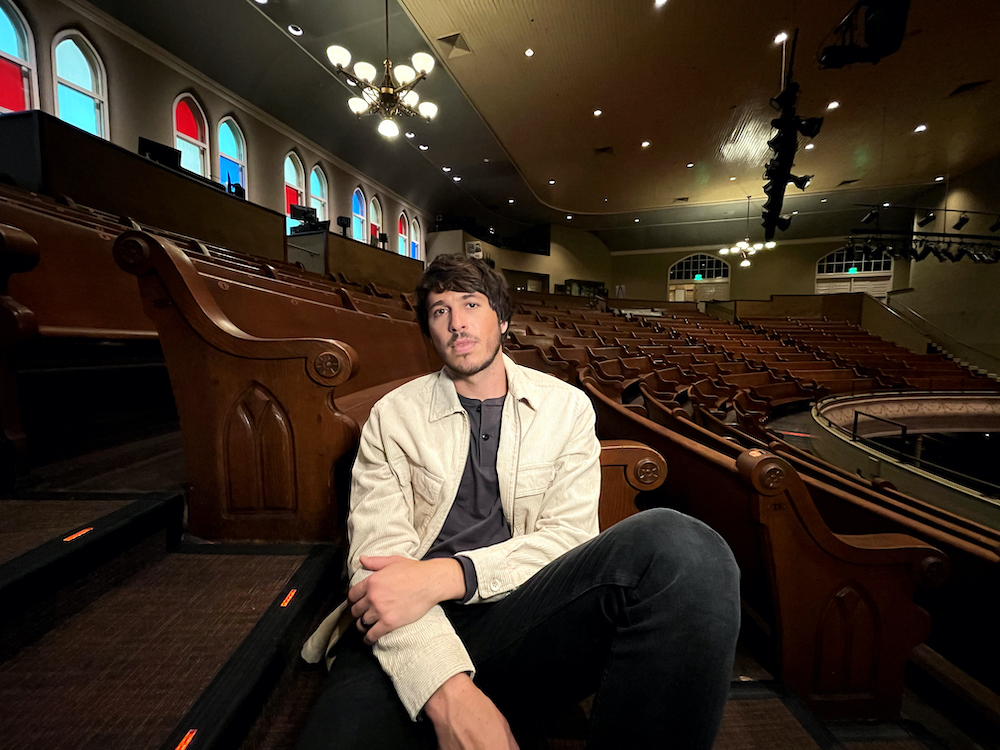
Morgan Evans at The Ryman, The Mother Church of Country Music, in Nashville. Shot on iPhone 12 Pro Max by Kelsea Ballerini for Rolling Stone Australia.
It was DeStefano who co-wrote “Kiss Somebody” and the spunky, grab-your-lover-in-the-kitchen double Platinum hit “Day Drunk”. The single came at a time when he and Kelsea Ballerini’s relationship was blossoming and, unfortunately due to her high profile, becoming a tabloid priority. Neither has waned. Snotty reports range from beach sightings to baby bump rumours – the latter of which saw Ballerini respond on Twitter to say, “Just carrying around my organs”.
The pair’s inception story is well known. Evans met Ballerini in Nashville in February 2016 at a showcase for that year’s Country Radio Seminar. They took an obligatory press photo together to hype their co-hosting engagement at the CMC Music Awards in Brisbane the following month. Their first proper conversation was at a pre-Awards dinner with Ballerini’s team and Evans’ late and beloved manager Rob Potts. They were sat opposite each other, deep in conversation as if they’d booked a table for two. After their Awards show hosting duties were finished and a few tequila truths later, they each had found their match.
“I mean, everything happened in fast forward,” Evans lights up as he remembers. “We went on our first date I think four days later here in Nashville and we got engaged eight months later.”
Evans is full of pride when he speaks of Ballerini. “She’s obviously beautiful, she’s sweet; but she’s super funny too. I didn’t know about that until we started hanging out. It was like, everything, I was done, all in, you know?
“[…] We didn’t really have time to mess around. It was like, this is how it is. This is how I feel. This is how I feel. Good. Me too. It was very much an open, candid conversation about all things. It clicked so quickly.”
Evans says Ballerini is his toughest and most honest music critic. Her feedback has progressed over the years from an encouraging “It’s not my favourite” response when Evans hasn’t hit the mark, to a silent, but clear indication. “It’s graduated in our third year of marriage to a look. It’s just a little shake of the head, a little nose thing.” Evans endearingly impersonates his wife by curling his top lip and scrunching his nose. “But at the same time, she’ll be like, ‘Well look, I just know what you’re capable of. I’ve heard other stuff that you’ve done. I’ve heard what you do around the house before you go to the session’.”
Morgan Evans has the gravitational effect of a star in the sky. A gift that only shines brighter when he speaks of Ballerini. “I used to start every day by saying, ‘Okay today I’m going to write the best song in the world. Here we go’. And now I’m like, ‘I hope I can write the best song in the house today’. That’s all I need.”
Evans is upbeat and friendly in almost any interview you’ll find online. He has the charisma of a country star lifer and the earnestness of someone who thinks they don’t quite deserve it. There’s only two moments in his history where any interview questions on the subjects are met with deep sadness. The first is his near death experience as a 21-year-old who fell asleep at the wheel on the drive home from Bluesfest Byron Bay to Newcastle. He and his girlfriend at the time escaped unscathed and Evans used the incident to promote safe driving when he visited students at his former high school.
The second is when he speaks of his late manager Rob Potts. Potts managed Evans’ career for a decade; between his national tour and festival projects with Rob Potts Entertainment Edge, he became Evans’ bridge to Nashville, thanks to decades of work advocating for Australian country music on both sides of the pacific. In October 2017, five months before Potts was due to experience yet another sold out CMC Rocks Festival headlined by Luke Bryan, a horrific motorcycle accident took his life.
Evans wrote the song “Things We Drink To” for Potts just before the Nashville memorial in 2017. The song became the title track of his second album, a heady mix of piano-driven pining and acceptance, entirely dedicated to Potts. The album charted in the US Billboard 200 and hit number five in Australia.
“I definitely wouldn’t be here if it wasn’t for him,” says Evans, taking pause. “There’s no way I’d be here. No way.”
Listen to Morgan Evans’ repertoire and you may beg to differ. Sticking to country music traditions, his experimental leanings anticipate a larger shift from non crossover country acts. Onstage you’ll catch him with a loop pedal, a beat pad, and even beatboxing in the intro for “Day Drunk”. On record, you can hear the seamless weaving of digital hip hop backbeats and folk elements. Taking the baton from acts like Sam Hunt, who has been called “the country Drake” for his use of syncopation, a complex rap flow, and Keith Urban who used digital backbeats on his single “Wasted Time”, it’s any wonder Evans is flourishing in the streaming era.
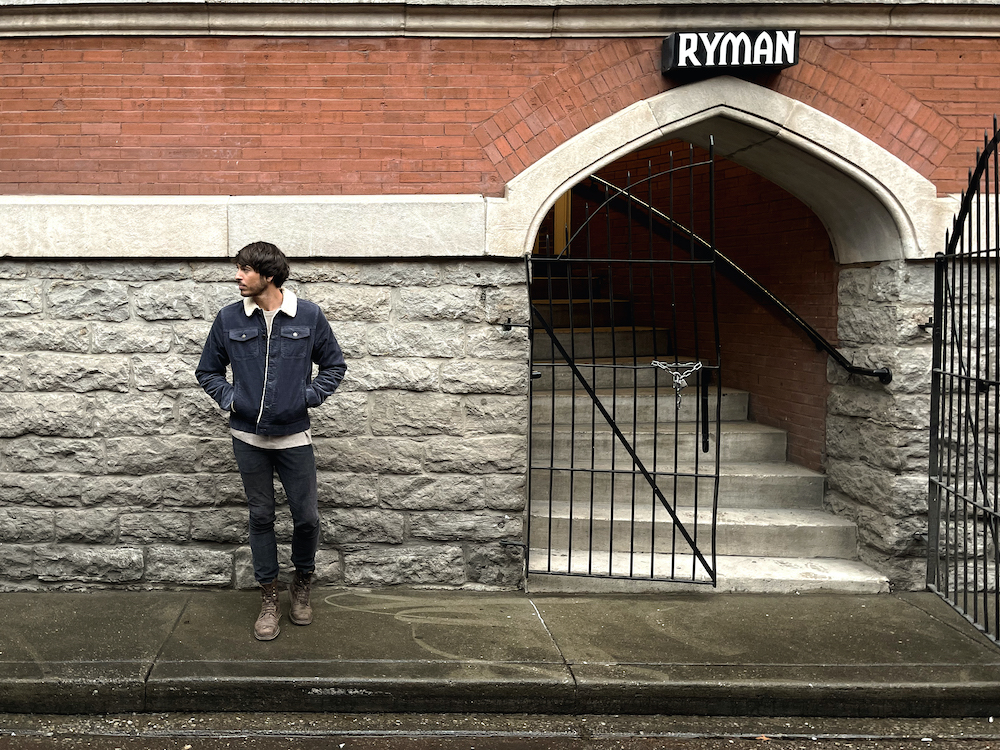
Morgan Evans at The Ryman Auditorium in Nashville. Shot on iPhone 12 Pro Max by Kelsea Ballerini for Rolling Stone Australia.
In August, Apple Music even tapped Evans for his own live digital radio show, Country Wide Radio. Launched alongside the streaming giant’s digital station investment in the genre, Apple Music Country, the show is inspired by the global artist-loving playlist of the same name.
“My manager said, ‘Hey, it’s all top secret’,” Evans remembers. “We had to sign NDA’s to have these conversations.”
Morgan Evans releases his show on Apple Music’s radio network every two weeks and his interviews with acts like The Wolfe Brothers, Kip Moore and CAM sit alongside Apple’s radio station offerings from Elton John, The Weeknd and Shania Twain, among others. For now, while Apple Music’s bespoke Nashville recording studio is waiting to open its doors again on the other side of COVID-19, Evans records from home on an iXm microphone. He even recorded a Christmas special where he playlisted Paul Kelly’s “How to Make Gravy”. “Imagine being able to introduce someone to Paul Kelly,” Evans gushes of the ARIA Hall of Famer. “What a privilege that is.”
Eventually, Evans will travel the globe with his radio show in tow, recording from Apple Music’s studio spaces in London, LA and New York and flying to wherever is needed to ensure Country Wide Radio lives up to its name.
“I want to go and see country music in South Africa more than anything,” Evans says. “I’ve learnt that there is a real scene there and some great music coming out of there.”
Perhaps one the most clear barometers of country music’s global ubiquity is Apple Music itself. Operating in 167 markets, Apple’s bread and butter is consumer engagement via technological advancement. So when its music streaming arm made the decision to launch Apple Music Country, it was global data that informed it.
Rachel Newman, Apple’s Global Head of Editorial and Content told Rolling Stone country music is the fastest growing genre in the world. “We were seeing both growth from a share point of view, but also fantastic engagement within properties that we already have on platform. It was a bit of a no brainer.”
“Australia is a really important country market for us – it’s in the top three markets worldwide. Morgan is obviously Australian but importantly is also a really successful global artist. So having his very unique perspective both as an Australian but also from the global stage was a really incredible opportunity. And on top of it all, he’s just a phenomenal talent.”
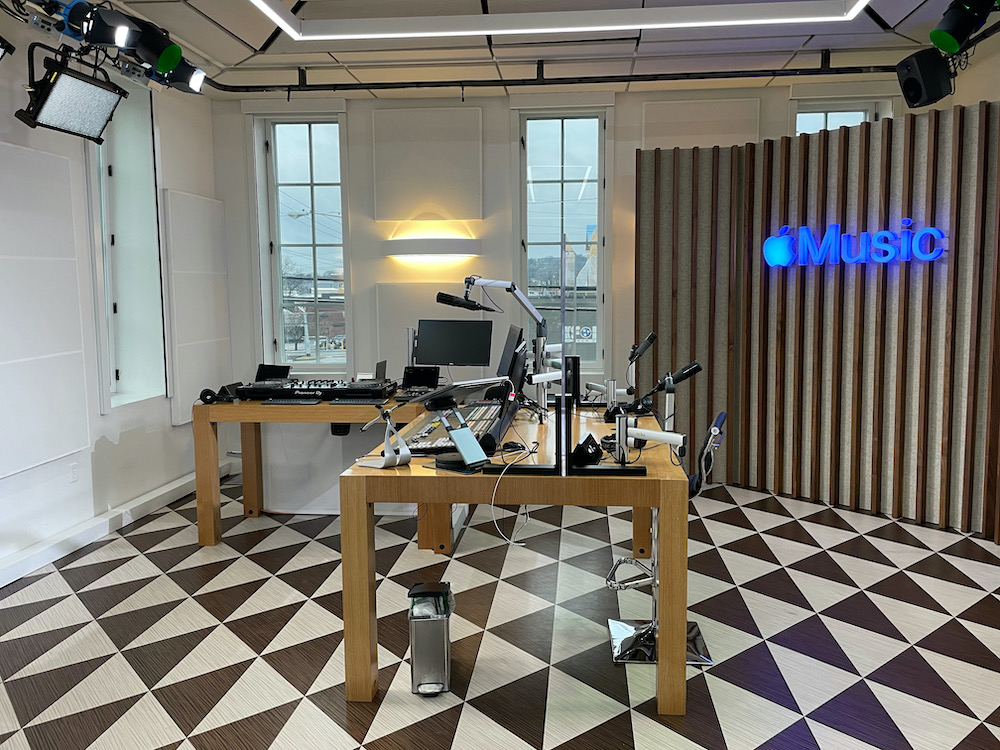
Apple Music’s Nashville studio
When Zane Lowe, Apple Music’s Global Creative Director, joined the juggernaut in 2015, the company was preparing for big moves in the country space. In 2018, Apple Music expanded to Nashville, taking over a 25,000 square foot building in Wedgewood-Houston. Its country music headquarters features both office, content creation and studio spaces.
“The sound of the music is changing shape,” Zane Lowe tells Rolling Stone. “The way people are doing business, building artists, building careers, is changing. So [the question was] how do we move with that and build a hub, a HQ in Nashville that reflects this era and helps country music prepare for the future?”
Much like Evans, Zane Lowe has always been driven by passion. His 12 years at BBC Radio 1 had him dubbed music’s “most enthusiastic” fan and there’s not one genre that doesn’t incite a string of knowledge-backed perspectives. Country music, and Morgan Evans, seems to make Lowe particularly excited as he details Nashville’s ability to “raise the game” of any songwriter who makes the pilgrimage. However, Lowe makes it clear that Apple Music’s show hosts aren’t picked based on accolades and statistics.
“If you just go by the data and the numbers of success in different things, that’s not going to make for a great listening experience on a radio level,” he assures. “So, whose got something to say and who will naturally lean into this space and probably get something really rewarding out of it? Because otherwise it’s just a trade.”
It’s getting late for Morgan Evans in Nashville now, the window behind him has turned into a jet-black rectangle. He’s got three songs to record and “multiple albums worth of material” to vet for album number three. Unfortunately, his recording process is on hold until January after a few of the people he planned to work with caught COVID-19. He tells me this with much concern for his collaborators and zero concern for his album timeline. Even looking ahead to what is an uncertain future for all, you get the feeling Evans is just happy to ‘work’ in music.
“I feel very lucky to be doing this,” he glistens. “I’m going to do it as best as I can. […] Even on a bad day you look back and 15-year-old you would be like, ‘You’re such a bad arse right now’, you know?”



































